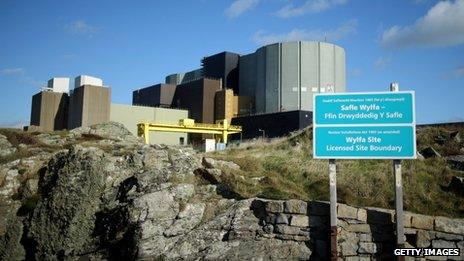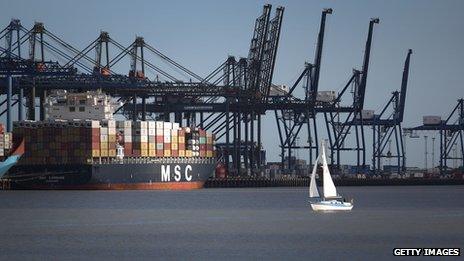UK government's infrastructure spending plan unveiled
- Published
Danny Alexander: "Over many decades we have underinvested in our infrastructure"
The government has unveiled its infrastructure spending plan for the next two decades, describing it as "a blueprint for Britain".
The National Infrastructure Plan (NIP) includes the government selling off its 40% stake in the Eurostar rail service.
About £375bn of investment in energy, transport, communications, and water projects is planned, although no new money will be forthcoming.
The insurance industry also plans to spend £25bn over the next five years.
Shadow financial secretary Chris Leslie: "We get lots of grand plans... but a total failure to deliver"
Speaking at the Institute of Civil Engineers in Westminster, Danny Alexander, Chief Secretary to the Treasury, said the plan was "a blueprint for Britain" that would lead to "long-term sustainable growth".
"Underground, overground, on shore, offshore, wired or wireless, tarmac or train track. You name it, we're building it right now," he said.
Earlier, he told the BBC that the UK had "underinvested... over several decades".
He denied that there was a north-south divide in how spending was being allocated, saying: "There are projects going on in every part of the country."
Last month, Eurostar posted a rise in revenues and passenger numbers compared with last summer, but Mr Alexander said no final decision had been made on the proposed sale.
Previous infrastructure spending programmes have been criticised for slow progress, but he said that of the 646 projects outlined in this plan, 291 had already been started or completed.
Katja Hall, chief policy director of the employers' organisation, the CBI, said: "With the majority of national infrastructure projects earmarked to be delivered by the private sector, the insurance industry's £25bn investment is good news."

The current Wylfa nuclear power station is due to cease work next year
But Chris Leslie, shadow chief secretary to the Treasury, said: "With the country facing a cost-of-living crisis we need to invest in infrastructure to create jobs, boost living standards, and strengthen our economy for the long term."
The government's record on infrastructure had been one of "complete failure", he said.
Jeremy Blackburn, UK head of policy for the Royal Institution of Chartered Surveyors (Rics), said the government should prioritise regional transport infrastructure investment.
"The better connected those areas are, the easier it is to move passengers, freight, goods and services," he told the BBC.
This would attract investment and help create jobs, he argued.
Rics also called for more investment in commercial and residential property, and reiterated its support for the HS2 rail project.
Insurance spending
Simultaneously to the NIP announcement, the insurance industry unveiled plans to invest £25bn in a range of infrastructure projects.
The decision by insurers L&G, Prudential, Aviva, Standard Life, Friends Life, and Scottish Widows to invest in infrastructure follows changes in European rules pushed for by the UK which incentivise investment in a wider range of assets.
Prudential has already invested £40bn in UK infrastructure, including property.

Felixstowe, the UK's largest container port, should benefit from the proposed improvements to the A14 trunk road in Suffolk
Group chief executive Tidjane Thiam said: "As a major long-term investor in the UK, Prudential is pleased to commit to harness our financial strength for the benefit of the UK economy. This initiative will help achieve sustainable economic growth."
Legal & General, which has invested £3bn in the last two years on various infrastructure projects, including university accommodation, said it was keen to spend more on construction.
Chief executive Nigel Wilson said: "We are very keen to help fund the creation of more housing - for sale, for private rent, and in the social sector - as having enough decent housing at sensible prices is crucial to the UK's recovery."
'Political will'
In September, CBI director general John Cridland said the government's infrastructure policy was "faltering" amid fears that it lacked the "political will" to deliver.
Critics have pointed to data showing infrastructure spending falling in recent times, not rising.
Labour said that despite schemes being announced with great fanfare, little was being done.
"The Office for National Statistics says that infrastructure work is down 3.7% in the last year, and fell by 10% in 2012. Scheme after scheme has been announced to great fanfare but then little actually delivered," said Mr Leslie.

- Published16 September 2013
- Published5 September 2013